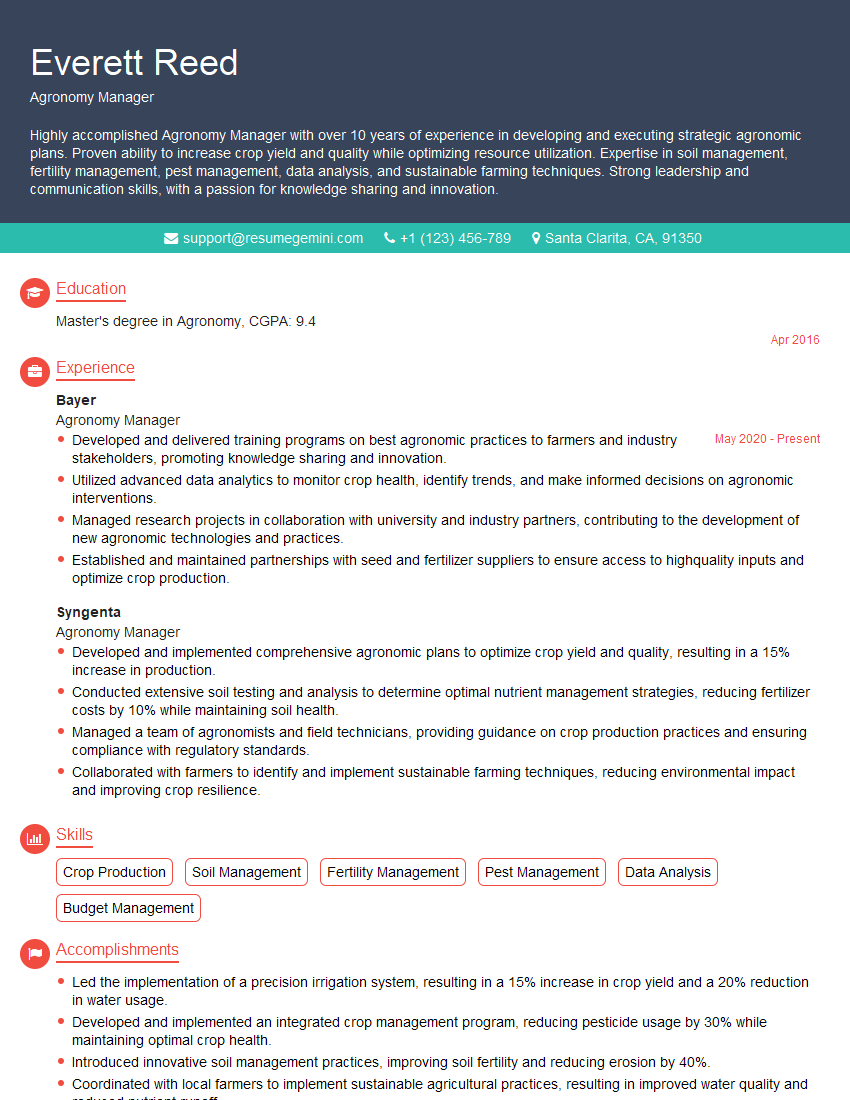Are you a seasoned Agronomy Manager seeking a new career path? Discover our professionally built Agronomy Manager Resume Template. This time-saving tool provides a solid foundation for your job search. Simply click “Edit Resume” to customize it with your unique experiences and achievements. Customize fonts and colors to match your personal style and increase your chances of landing your dream job. Explore more Resume Templates for additional options.

Everett Reed
Agronomy Manager
Summary
Highly accomplished Agronomy Manager with over 10 years of experience in developing and executing strategic agronomic plans. Proven ability to increase crop yield and quality while optimizing resource utilization. Expertise in soil management, fertility management, pest management, data analysis, and sustainable farming techniques. Strong leadership and communication skills, with a passion for knowledge sharing and innovation.
Education
Master’s degree in Agronomy
April 2016
Skills
- Crop Production
- Soil Management
- Fertility Management
- Pest Management
- Data Analysis
- Budget Management
Work Experience
Agronomy Manager
- Developed and delivered training programs on best agronomic practices to farmers and industry stakeholders, promoting knowledge sharing and innovation.
- Utilized advanced data analytics to monitor crop health, identify trends, and make informed decisions on agronomic interventions.
- Managed research projects in collaboration with university and industry partners, contributing to the development of new agronomic technologies and practices.
- Established and maintained partnerships with seed and fertilizer suppliers to ensure access to highquality inputs and optimize crop production.
Agronomy Manager
- Developed and implemented comprehensive agronomic plans to optimize crop yield and quality, resulting in a 15% increase in production.
- Conducted extensive soil testing and analysis to determine optimal nutrient management strategies, reducing fertilizer costs by 10% while maintaining soil health.
- Managed a team of agronomists and field technicians, providing guidance on crop production practices and ensuring compliance with regulatory standards.
- Collaborated with farmers to identify and implement sustainable farming techniques, reducing environmental impact and improving crop resilience.
Accomplishments
- Led the implementation of a precision irrigation system, resulting in a 15% increase in crop yield and a 20% reduction in water usage.
- Developed and implemented an integrated crop management program, reducing pesticide usage by 30% while maintaining optimal crop health.
- Introduced innovative soil management practices, improving soil fertility and reducing erosion by 40%.
- Coordinated with local farmers to implement sustainable agricultural practices, resulting in improved water quality and reduced nutrient runoff.
- Developed a comprehensive nutrient management plan, reducing fertilizer costs by 12% while maintaining optimal crop nutrition.
Awards
- Recipient of the National Crop Management Award for outstanding innovation and leadership in developing sustainable crop production practices.
- Recognized with the Precision Farming Award for implementing cuttingedge technology that optimized crop yield and reduced environmental impact.
- Awarded the Soil Science Society Fellowship for significant contributions to advancing soil health and management practices.
- Received the American Society of Agronomy Early Career Achievement Award for pioneering research in notill farming practices.
Certificates
- Certified Crop Adviser (CCA)
- Certified Professional Agronomist (CPAg)
- Certified Soil Scientist (CSS)
- Certified Nutrient Management Planner (CNMP)
Career Expert Tips:
- Select the ideal resume template to showcase your professional experience effectively.
- Master the art of resume writing to highlight your unique qualifications and achievements.
- Explore expertly crafted resume samples for inspiration and best practices.
- Build your best resume for free this new year with ResumeGemini. Enjoy exclusive discounts on ATS optimized resume templates.
How To Write Resume For Agronomy Manager
- Highlight your experience in developing and implementing successful agronomic plans.
- Quantify your accomplishments with specific metrics, such as increased crop yield or reduced fertilizer costs.
- Emphasize your ability to manage a team and collaborate with farmers.
- Showcase your knowledge of sustainable farming techniques and data analytics.
- Proofread your resume carefully for any errors.
Essential Experience Highlights for a Strong Agronomy Manager Resume
- Develop and implement comprehensive agronomic plans to optimize crop yield and quality.
- Conduct extensive soil testing and analysis to determine optimal nutrient management strategies.
- Manage a team of agronomists and field technicians.
- Collaborate with farmers to identify and implement sustainable farming techniques.
- Develop and deliver training programs on best agronomic practices.
- Utilize advanced data analytics to monitor crop health and make informed decisions.
Frequently Asked Questions (FAQ’s) For Agronomy Manager
What are the key skills required for an Agronomy Manager?
Key skills include crop production, soil management, fertility management, pest management, data analysis, and budget management.
What is the role of an Agronomy Manager?
An Agronomy Manager is responsible for developing and implementing agronomic plans to optimize crop yield and quality, manage soil and fertility, control pests, analyze data, and ensure compliance with regulatory standards.
What are the career prospects for an Agronomy Manager?
Agronomy Managers can advance to roles such as Regional Agronomy Manager, Director of Agronomy, or Chief Agronomist.
What is the average salary for an Agronomy Manager?
The average salary for an Agronomy Manager in the United States is around $80,000 per year.
What are the educational requirements for an Agronomy Manager?
Most Agronomy Managers have a Bachelor’s or Master’s degree in Agronomy or a related field.
What are the key challenges facing Agronomy Managers?
Key challenges include climate change, pests and diseases, and the need to increase crop production while minimizing environmental impact.